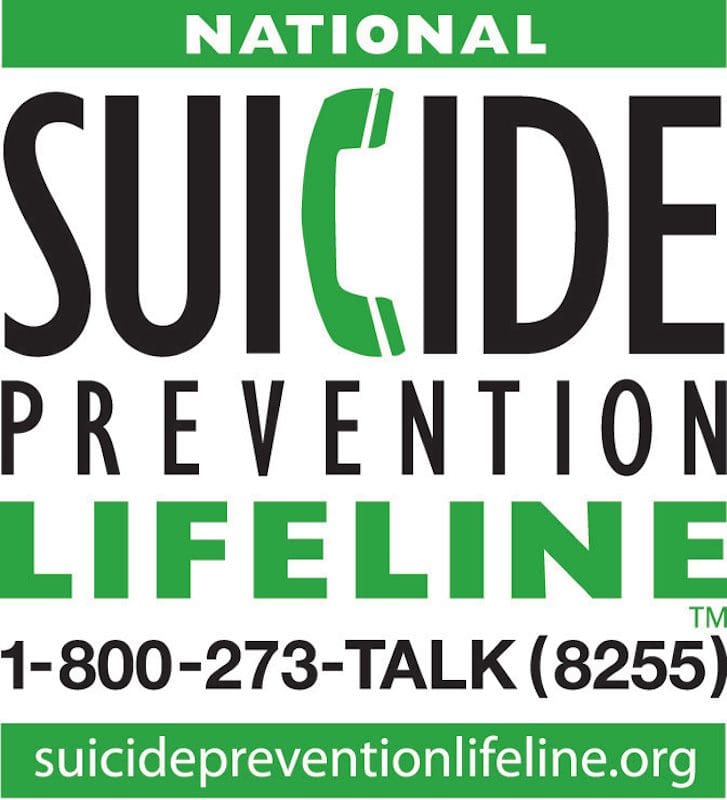When And How To Talk To Your Teens About Suicide
September is Suicide Prevention Awareness Month — a time to raise awareness on this topic that is still too often considered taboo. Suicidal thoughts, much like mental health, can affect anyone regardless of age, gender or background. It is one of the leading causes of death in the United States of 15 to 19-year-olds. Girls That Create writer Roxana Bouwer has put together a thoughtful post about her own life experiences with suicide and how parents and caregivers can talk to teens. Names have been changed.
The First Encounters
My first indirect encounter with suicide was in high school. I was 15 years old, and a friend’s 18-year-old boyfriend hung himself. Five years after that, a different friend’s dad shot himself in their pool room. A few years later, I was getting ready to go to a film awards evening with a group of friends. Jenna called me while I was getting ready: “Anthony’s hung himself.”
I have an old memory of driving with my mom through an unfamiliar suburb. I can’t remember if she was talking to eight-year-old me or another adult in the car. She pointed down one of the roads we were passing by and explained that someone she knew from her current company used to live there but had recently killed himself because of money stress.
I believe I knew about “people killing themselves” before I had a specific term for it. That day in the car, it felt like a dark, heavy thing that happened quietly and in passing. It felt shocking, unfathomable, confusing, and incredibly uncomfortable in my young body. My heart absorbed the pain of loss, even if it was indirect and personally detached.
Is it exaggerating to say that almost every adult knows or knows of someone who’s killed themselves? According to the World Health Organization, a person commits suicide every 40 seconds. That doesn’t account for all the unsuccessful suicide attempts.
With suicide considered a leading cause of death in the U.S. and with one in five teens thinking about suicide in the past year, the call is to get curious, deepen our understanding, and talk more openly about why this is happening and what we need to do to change it.
Why Do People Kill Themselves?
The question of why people kill themselves is one worth asking, considering, and discussing openly. The broad, existential answer is immense inner suffering, accompanied by a profound sense of being utterly alone, with no perceived way out. Here are three aspects of psycho-spiritual and emotional health, which often play a role in the nuanced “why” of a suicide.
Anxiety and suicide:
Our nervous systems are not equipped to process extreme situations of unrelenting high stress over extended periods. It’s one thing to have a hellish day at work or school now and then. It’s quite another to feel trapped in a situation where there’s constant pressure and expectation to perform at your best, no matter your energy levels, life circumstances, or inner struggles.
This inhumane degree of psychological stress causes anxiety. We’ve all been anxious before. It’s disruptive, debilitating, and makes rational thought impossible.
There’s a correlation between anxiety disorders and suicide risk. Unfortunately, anxiety is so commonplace these days that it goes largely untreated.
Depression and suicide:
Suppose we choose a more existential approach to our understanding of depression, outside of the medically defined “low mood and loss of interest in activities.” In that case, we may come to a more holistic understanding.
To depress something is to push it down. A depressed person does not present as their fully embodied, connected, highest self. Instead, a depressed person, and I speak from experience, is vacant. One’s life force is minimal, and connection to self is severed.
In other words, for one reason or another, a depressed person is pushing down or suppressing their authentic self. If we cannot wholly be who we are (be it due to a damaging childhood, traumatic events, internalized societal pressures, or whatever else), we either fragment or entirely suppress ourselves. We sever any connection to self and therefore amputate our ability to feel connected to other people or any aspect of life and the world. Denying our true nature is a recipe for existential misery.
Unsurprising then that experiencing depression goes hand in hand with thoughts like “I’m all alone,” “I have no way out of this suffering/situation,” “I’m a burden,” “I’m worthless,” “I can’t do this anymore.” While far from all cases of depression end in suicide, it’s easy to see how the gap between “I can’t anymore” and suicidal thoughts can quickly close in on a particularly dark day.
Trauma and suicide:
Big “T” trauma covers events like physical and sexual abuse, car accidents, and the sudden death of a loved one.
Little “t” trauma is the more quiet, sustained experiences that erode us over time: lack of emotional availability from a parent in childhood, ongoing financial stress growing up, a parent who couldn’t self-regulate and expressed themselves in destructive ways.
A new understanding of trauma is any experience that was too overwhelming for your nervous system to process fully. Author and retired physician Dr. Gabor Maté explains, “Trauma is not what happens to you; it’s what happens inside of you as a result of what happens to you.”
People with a history of unresolved trauma are at higher risk for suicide because trauma in the body triggers overwhelming anxiety responses. A traumatized person is fragmented or disassociated, therefore not feeling whole and connected and thus predisposed to depression.
In severe cases of PTSD, flashbacks, and night terrors, as examples, it’s easy to see how someone regularly reliving traumatic experiences may see no way out and feel desperate to end their inner pain.

When And How To Talk To Your Teens About Suicide
As with all things in life, it’s better to have the topic open and on the table long before you find yourself in a situation where, in this case, it’s much closer to life or death.
Before talking to your children, take responsibility by being an intentional observer. Life is challenging and complex. It’s not worth putting your teen’s mood swings, dark jokes, withdrawal, or changes in personality and interests down to their age. Get curious, not sad. Yes, it isn’t easy being the parent of a teenager. But, remember what it was like being a teenager? I do: Excruciating at times.
Talking to your teen about suicide:
- Keep it natural and informal. If a suicide occurs on a show or movie you’re watching together, or the news discusses mental health, use these incidents as starting points to ease into a discussion. Mental health is topical at the moment; use the opportunity.
- Frame it within the context of general mental health. Share your experiences of being stressed or anxious as a teen and follow your daughter’s lead if they ask questions about what you’re sharing.
- Express your concern openly. Speak to real-life experiences you’ve had or know of and why you feel you need to talk to them.
- Normalize talking about difficult emotions, inner struggles, and negative experiences. Lead by example here. You can’t expect your teen to open up if you don’t show them how to be vulnerable and what it looks like to healthily express your inner experience when you are having a hard time.
Checking in with your teen:
- Go beyond the daily homework checks. Ask about their inner world. Use interesting questions. “Are you okay?” requires a lot of work and vulnerability on their part. Consider using questions that do the legwork for them: “Hey, I’d love to understand what it’s like for you to be away from your friends so much?”
- Listen objectively. These conversations are not the time to try to fix or get involved. You’ll push your child away if you do so because fixing and parental opinions/advice can feel incredibly invalidating.
- Validate their experience: “I can see how that would be hard.” “It makes sense that you’d feel alone being stuck in this apartment with dad and me.”
- Ask open-ended questions to encourage deeper sharing: “Can you say more about that to help me understand?” “What do you experience in your body when you think of how much homework you have?”
Setting Your Teen Up For Good Mental Health
Anxiety, depression, and trauma are all predispositions for suicide. Creating a loving environment that fosters connection, authentic self-expression, and truth-telling makes it very hard for these difficulties to manifest.
- Be honest about your family history and your child’s upbringing. If your child experiences trauma (hint: we all have to some degree), get serious about getting them help to start healing. Depending on the degree of what happened, this may not look like formal therapy. It may look like supporting their desire to start a new activity that brings them joy.
- Humans are social creatures. We thrive on connection, and teens need a sense of solid peer-to-peer connection. Support your child’s healthy social life by being the parent that takes everyone on a camping trip or helps set up the virtual movie night.
- Explore mindfulness activities like meditation, yoga, and the creative arts as a family. These are ways to help your teen learn how to navigate life’s difficulties through cultivating a strong, loving connection to themselves.
- Encourage self-expression. One of the most empowering things you can do is be supportive while your teen discovers and expresses their authentic self. One that is beyond societal and familial pressures of who they should be. Again, speak less and listen more. Follow their lead and make parental structure and wisdom secondary as you gently guide them on their inner path.
Share this article and help empower other parents to understand suicide better and support their teens.
If you or someone you know is in an emergency, call The National Suicide Prevention Lifeline at 800-273-TALK (8255) or call 911 immediately.
Resources
National Institute of Mental Health
National Alliance on Mental Health
Suicide Prevention Resource Center (SPRC)
Written by Roxana Bouwer
Top photo by Eric Ward on Unsplash
More Girls That Create Posts
Sound It Out Promotes Mental Health for Middle Schoolers with New Music
Can Media Consumption Shift Teens From Mental Hell to Mental Health?
GirlUp Talk Focuses on Mental Health and Reducing Stigma With Dialogue

